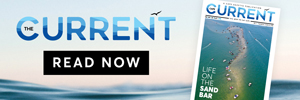The horseshoe crab is a mysterious, ancient and fabulous creature that makes its home here in Delaware. It’s become a symbol of sorts of our beautiful southern Delaware coast. Please let’s support its survival by stopping the practice of bleeding them for pharmaceutical purposes and harvesting them for bait in Delaware.
This spring, I was thrilled and fascinated to serve as a volunteer for the first time for the Delaware Center for the Inland Bays’ annual Horseshoe Crab Survey and Tagging.
At 10 p.m. a few nights in May and June, I joined a team of about a dozen volunteers who waded along the high tide line at Tower Road beach on Rehoboth Bay. Our goal was to count the number of crabs mating during high tide and to carefully tag about a hundred of them. The smaller males outnumbered the large females by 10 to 1, often more. They skittered more quickly than you could imagine across the sand in the shallows, racing to mate with females. I’ll never forget the clicking and clacking sound of the shells scraping against each other.
So I was dismayed and deeply disturbed to learn from an NPR story of June 10 (“Coastal biomedical labs are bleeding more horseshoe crabs with little accountability”) that industry took blood from more than 700,000 crabs in 2021 despite the fact that a synthetic alternative is available and used in Europe. I could barely look at the photos of crabs lined up and lashed to stainless steel tables, needles piercing their hearts to pull out more than half their incredibly blue blood. Many crabs do not survive this procedure.
That story was followed by the very informative letter to the editor in the June 16-19 edition by Steve Cottrell, president of Delaware Audubon, concerning Delaware’s continued harvest of the crabs for bait. This has resulted in the serious depletion of the crabs and reduced the supply of crab eggs for the red knot, a migratory bird that relies upon them, causing the number of red knots to decline dramatically in Delaware. Other species also rely on the crabs.
Cottrell writes that New Jersey, South Carolina and Connecticut prohibit bait harvest of crabs. Why doesn’t Delaware ban bait harvest? It seems to me that our state has the greatest responsibility to protect one of the oldest species on our planet, since Delaware Bay has the greatest concentration (according to Cottrell).
You can find more information and join the effort to protect this ancient species so special to Delaware at the Horseshoe Crab Recovery Coalition’s website: https://hscrabrecovery.org/.

















































